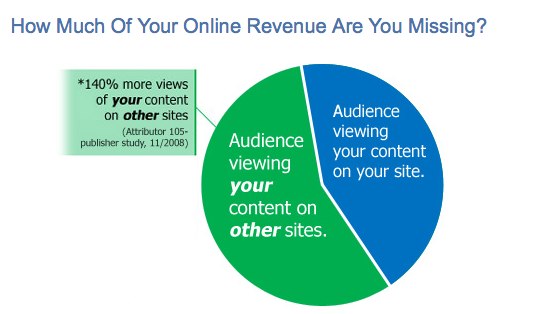Startup wants to help newspapers but (get this!) news execs need proof of problem first

There was a piece in the New York Times this morning that, at the heart of the story, was about a start-up called Attributor, which is launching an ad-revenue sharing service for those who create original content (newspapers) and those who copy and re-post it (some blogs and websites).
It's an interesting idea - but here's what rubbed me the wrong way about the NYT piece. The headline, first of all, read: "Start-Up Plans to Make Journalism Pirates Pay Up" and then the first paragraph went on to talk about how online piracy isn't just a problem for music companies but also newspapers and magazines.
Man, talk about feeding a self-serving agenda.
This is not about piracy of newspaper content. Allow me to say it one more time for the newspaper executives who didn't read/see/hear it right the first time. This is NOT about piracy of newspaper content.
This is about the fact that someone other than an newspaper executive came up with a revenue-sharing model that actually just might work.
You know why newspapers couldn't come up with this idea on their own? Because the executives who are calling the shots still have their heads buried in the sand over this. They don't see the problem and actually - get this - need proof.
Seriously. Proof! Here is the excerpt from the Times story that drives home this point:
For now those companies have committed only to receiving data from Attributor about how widely their content is being used on Web sites that don’t pay for it. Later they will decide whether to proceed with the revenue-sharing plan.
“We’re in ‘prove it’ mode,” said Jim Pitkow, the chief executive of Attributor. “We are going to prove to them piracy is an issue and here is the scale. Then we will take that to the ad networks.”
Here's some proof for you: Financial statements, circulation figures, shuttered newspaper in Seattle, Denver and other cities. And let's not forget all of the talented journalists who have been handed pink slips over the past year or so? Is that not proof enough?
The newspaper industry - much like the music industry - for years saw their old, stale business models being challenged by technology and knew only one way to respond: cry foul. They resisted. They threatened. They sued. They tried to hold back the technologies and they tried to dictate the rules.
And they lost. They couldn't even sue their way out of slowing down the transformation.
Previous coverage: Google can't save newspapers; smart to dump print-ad project
So, here's some advice, newspapers. If you're going to make a company like Attributor prove to you that there's a problem, make it a quick study. The time is now - in fact, the time was yesterday - to pull your head out and start grasping any and every new way you can find to help keep the revenue pipeline flowing.
And finally. please quit thinking that readers are going to change their habits overnight and suddenly start paying you for your original content. There's free content all over the Internet and most readers - myself included - won't want to pay for something we'll get free of charge elsewhere.
I'm not saying that Attributor is the savior that will bring newspapers back to life. But it's a smart idea that could be part of the overall transformation, one that deserves a chance by the parties involved.
Finally.